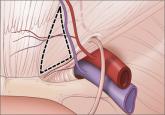Expert Commentary

Does vaginal prolapse repair using synthetic mesh confer long-term benefit over native-tissue colpopexy?
Not at this time.

SGS Fellow reports for OBG Management
3/26/14. Day 3 at SGS
Debates, rebuttals, and relaxation
The morning at SGS was divided up between the small-group academic roundtables with experts in the fields. Topics ranged from mesh complications to coding and billing, and even a primer on urology for the gynecologist.
In the main hall, Drs. Dee Feener and Mark Walters outlined the challenges and opportunities for training the next generation of gynecologic surgeons. Dr. Feener argued that there simply are not enough cases, not enough time, and not enough people to train excellent surgeons. A perfect storm. Dr. Walters outlined his program and resident support at the Cleveland Clinic, showing how to provide robust experience and feedback to residents and fellows. Questions from the audience were pointed, and questioned the need to track obstetrics and gynecology separately for trainees.
Oral posters today also added to the debate with Vanderbilt sharing their hysterectomy training experience both before and after adding a fellowship. They did not see any change in vaginal hysterectomy participation over time. Most interesting was a study looking at abstract acceptance rates if an institution, research network, or author were disclosed in the body of a blinded abstract. They saw a much higher rate of acceptance if the source of the research was known by the reviewer. In his discussion, Dr. John Gebhart mused if the quality of these studies were somehow better, or if this perceived association resulted in any true bias. Nevertheless, the audience was actively engaged in the discussion.
The morning's highlight was certainly the debate over cosmetic gynecologic surgery. Dr. Rachel Pauls advocated FOR labiaplasty and Dr. Becky Rogers AGAINST. Though spirited and based largely on the principals of medical ethics, the final blow came from Dr. Rogers as she distributed Love Our Labia (LOL) buttons to the audience and presented Dr. Pauls with a pink LOL t-shirt. The Twitter feed exploded after this.
Follow us on Twitter @obgmanagement #SGS14.
The evening wrapped up with a lively social event in the exhibit hall with the meeting sponsors, colleagues, and friends.
We were also honored to have Dr. Clifford Ko, director of the American College of Surgeons Quality Improvement Program, as the esteemed Telinde lecturer. This robust and data-filled talk underlines his thesis that accurate, believable, and actionable data can be used to create quality in surgery. Quality improvement is local, he stated, and culture is the hardest institutional characteristic to change. Though any team working together on quality will elevate their culture if the data are good and the benefit to patients is clear. Dr. Ko, a colorectal surgeon at UCLA, is also now an honorary member of SGS.
The afternoon adjourned after the business meeting, and members were able to play golf, tour the desert in 4-wheel drive, or just relax in the lazy river by the pool. Activities were threatened by a large dust storm in Phoenix, but I have heard of no reports of problems.
Everyone convened at the outside terrace for the evening Fiesta Margarita reception. Over drinks and Southwest-themed sombreros, the new Michael Aronson Fund was announced to support Surgeons Helping Advance Research and Education (SHARE). This was the result of more than $25,000 raised by the program committee and SGS Board. Tomorrow looks to be an excellent conclusion to a well-planned and very well-executed meeting.
Follow us on Twitter @obgmanagement #SGS14.
3/25/14. Day 2 at SGS
Scientific sessions and socializing
The first day of the SGS scientific sessions was another energetic and interactive day. Oral posters stimulated heated debates on uterine morcellation, asymptomatic prolapse, and resident training. The Fellows Pelvic Research Network (FPRN) presented their work on the introduction of robotic hysterectomies to training centers. They showed that number of hysterectomies went down, and participation in robotic cases was poor.
This was followed by the exceptional keynote address by Dr. Barbara Levy. She shared her expertise of health policy and described the coming of quality-based payment, value in Supervises, and the need to protect resources. She predicted that hospitals need to cut costs by 25% to 30% in the next 5 years just to survive.
The afternoon videofest included surgical techniques, anatomy instruction, and a comprehensive review on bowel surgery for the practicing gynecologist.
For the second year running, the SGS hosted a mock NIH study session. Dr. Katherine Hartmann of Vanderbilt University provided background prep to prepare fellows for a K or R award application. Combined with a most-study section review of two actual applications demystified the process of grant review (and rejection).
The FPRN met to update their ongoing projects and to review new proposals. This was an enlightening and engaging session which should give everyone great hope to see the creativity and energy of the next generation of researchers.

Not at this time.

Laparoscopic surgery is a safe and effective option for many patients, provided the surgeon knows the relevant anatomic landmarks and variations...
The most promising alternative to open power morcellation is morcellation in a bag, described here

Attention to the costs of the surgical devices, instruments, and related products you use can help ensure greater value for the care you provide—...
